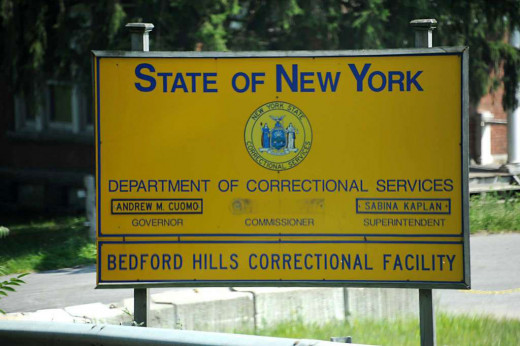At the facility in Westchester County, the largest New York state prison for women, incarcerated people were faced with contaminated drinking water over the summer. It smelled “like cars, sewage and stuff that I’ve never smelled in water before,” says Joy Powell, a 60-year-old who’s been held in the prison since 2007. “I was throwing up and had diarrhea for like two weeks just from trying to drink the water.”
She also recalls taking ice cold showers from June through mid-October, on top of being housed in facilities where incarcerated people have long reported rampant roaches, rats and mold. Incarcerated people at Bedford Hills also say that proper treatment of COVID-19 and other health issues is not provided, with basic public health precautions being largely ignored by prison staff and guards.
Now, the maximum-security prison is experiencing an influx of women and transgender and non-binary people — all held pre-trial — who are being transferred from Rikers Island. The transfers, which began in October, come after renewed calls to close Rikers and address the increasingly inhumane conditions on the penal colony. Over the past few months, Rikers Island has experienced heightened levels of violence, deteriorating physical conditions and a life-threatening lack of services, all resulting in suicides and suicide attempts.
The move was announced in conjunction with Gov. Kathy Hochul’s long-awaited signature of the Less Is More Act, aimed at reducing the number of people incarcerated at Rikers for minor parole violations.
Why transfer marginalized people in Rikers’ women’s quarters to an out-of-city prison with dangerous conditions rather than address the humanitarian crisis?
However, incarcerated people, organizers and attorneys are raising many concerns about the impacts of moving women and trans and gender non-conforming people who have not yet been sentenced to the state prison system. Advocates say the shift from Rikers to a maximum security facility 44 miles away from the city not only isolates people from their loved ones and creates complications around access to legal support, but also puts individuals into a carceral environment where they are treated as if they have been sentenced.
So far, approximately 100 people, including women and a few trans individuals, have been transferred to Bedford Hills. A total of 232 people are slated to be moved from Rikers to both Bedford Hills and Taconic Correctional Facility, but the process has been plagued by a lack of transparency from city and state officials about exactly how and when people will be moved. Detainees are typically given 48 hours to pack up their personal property and contact their loved ones and legal support before a transfer occurs.
The transfers mark an unprecedented move that “completely flies in the face of … constitutional protection in terms of having access to counsel and innocence until proven guilty,” says Mik Kinkead, a trans staff attorney for the Rikers Civil ReEntry Project at the Legal Aid Society. While visiting hours extend from 8 a.m. to 8 p.m. every day of the week at Rikers, visiting hours at Bedford Hills end at 3:30 p.m. on weekends, and were temporarily extended to end at 7 p.m. Some attorneys have been successful in video chatting their clients, Kinkead says, but it’s unclear if that access has been granted to loved ones.
People who are transferred are “going to feel like they never actually got a fair chance in court,” Kinkead told The Indy. “They’ve been deprived from their community, from their providers, from their family.”
Trans people and non-citizens have the option to oppose being transferred, and attorneys have been advocating for cis people with medical, legal and other needs to stay in the city. Attorneys who are advocating to oppose a client’s transfer can call or email with a reason not to transfer. But mistakes have been made in terms of people ending up on transfer lists who are not supposed to be there.
“I think we would all rest more easily if we could clearly see our clients’ names on a ‘do not transfer’ list and know they are on there,” Kinkead wrote in an email to The Indy. “So far we just have this reporting and then we monitor to make sure no client accidentally gets on the transfer list.”
Some trans individuals, for reasons related to their safety and status of their trial, have elected to remain at Rikers, while others have chosen to go up to Bedford Hills. Kinkead says people at Rikers have had “wildly different experiences based upon their race and based upon how long they’ve been inside.” Black and/or Latinx trans men have reported being sent to solitary more than white trans men.
Hochul’s decision still exposes a contradiction in the state’s approach to carceral reform: Why transfer marginalized people in Rikers’ women’s quarters to an out-of-city prison with dangerous conditions rather than address the humanitarian crisis in men’s jails, where public defenders say conditions are more severe?
